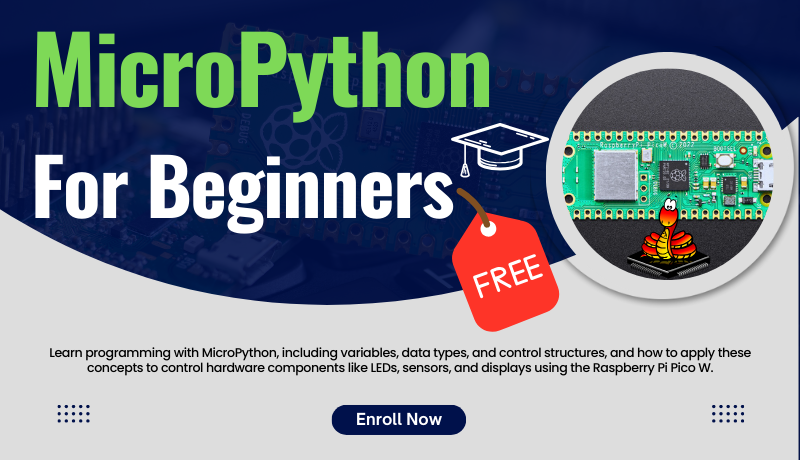![]()
IoT Unlocked: Your Journey to Innovation Starts Now
![]()
IoT Unlocked: Your Journey to Innovation Starts Now

Welcome to “Basics of MicroPython with Raspberry Pi Pico W,” a comprehensive course designed to introduce you to the fundamentals of MicroPython programming using the Raspberry Pi Pico W microcontroller. Whether you are a beginner eager to explore microcontroller programming or someone looking to enhance your skills, this course offers a practical, hands-on approach to learning.
In this course, you will:
By the end of this course, you will:
This course is ideal for:
Join us on this exciting journey to master MicroPython with Raspberry Pi Pico W and take your programming skills to the next level. Enroll today and start building your own projects with confidence!
We'll cover what MicroPython is, its history and development, and compare it with other microcontroller programming languages.
This foundational knowledge will set the stage for understanding how to program microcontrollers using MicroPython, leading to hands-on applications with the Raspberry Pi Pico W.
Welcome to "Basics of MicroPython with Raspberry Pi Pico W"! Before you get started, please take note of the following important information:
Hardware Requirements: Ensure you have all the necessary hardware components, including a Raspberry Pi Pico W, a micro USB cable, a breadboard, LEDs, resistors, and push buttons. Detailed hardware requirements are listed in the course description.
Software Setup: This course requires you to use the Thonny IDE for writing and uploading MicroPython code to your Raspberry Pi Pico W. Instructions for downloading and setting up Thonny will be provided in the course.
Internet Access: You will need a stable internet connection to access course materials, watch video lectures, and download necessary software.
Self-Paced Learning: This course is self-paced, allowing you to progress through the material at your own speed. Take your time to understand each concept and complete the exercises.
Technical Support: If you encounter any technical issues with your hardware or software setup, support is available through the course’s communication channels. Please feel free to reach out for assistance.
Course Assessments: Quizzes and practical exercises are included to reinforce your learning. It is highly recommended to complete these assessments to ensure you understand the material.
Lifetime Access: Upon enrollment, you will have lifetime access to the course materials, allowing you to revisit and review the content at any time.
Thank you for enrolling in this course. We hope you have a great learning experience and gain valuable skills in MicroPython programming with the Raspberry Pi Pico W!